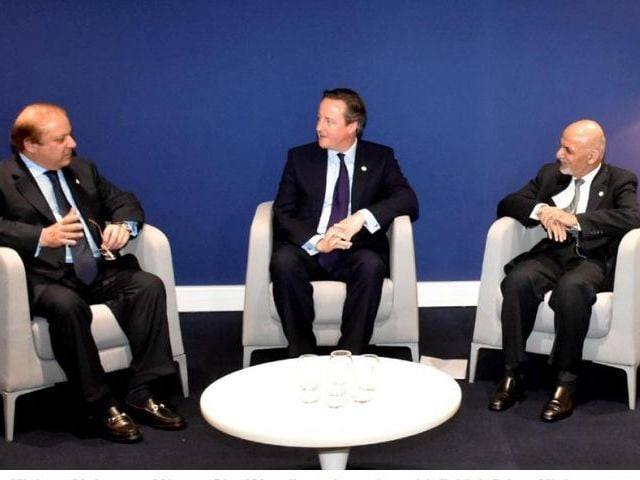Ghani-Sharif Paris huddle to bridge barriers between both nations
Analysts say elements sabotaging good relations between neighbours active again

Prime Minister Nawaz Sharif in a trilateral meeting with British Prime Minister David Cameron and Afghan President Ashraf Ghani on the sidleines of COP 21 climate change summit in Paris on November 30, 2015. PHOTO: PID
The most important aspect of the meeting was an agreement to “work with all those who would enter such a process as legitimate political actors and work with the Afghan government against all those who refuse to take the path of peace.”
Nawaz renewed Pakistan’s offer to facilitate peace talks. The onus to carry the process forward and to avoid the traditional blame-game now lies with the leaders of the national unity government.
Former Taliban leaders also see the Paris meeting as a possibility to revive the stalled reconciliation process. Syed Akbar Agha, a former senior Taliban commander, says Pakistan and Afghanistan should not miss the opportunity available after the Ghani-Sharif meeting in Paris. “The meeting of the Pakistani and Afghan leaders is a major breakthrough in itself, since it happened at a time of deep mistrust,” Agha told The Express Tribune from Kabul on Friday. He added that the growing trust between Pakistan and Afghanistan could “compel” the Taliban to join the intra-Afghan dialogue.
Setting good precedence
As the Ghani-Sharif meeting has helped reduce tensions between both countries, the Afghan leader is expected to come up with a positive response to Nawaz’s invitation to jointly inaugurate the regional meeting of Istanbul Process in Islamabad next week.
This ministerial conference, ‘Heart of Asia – Istanbul Process’, is very important for Afghanistan, and Ghani’s presence will give the peace process a major boost. Some key members of participating countries have also asked for high-level attendance at the December 9 conference.
International response
Stakeholders including China and Britain have also welcomed the possibility of peace between Pakistan and Afghanistan.
At a daily press conference on Wednesday, Chinese Foreign Ministry Spokesperson Hua Chunying said China is ready to play a constructive role in improving Pak-Afghan ties and promoting reconciliation in Afghanistan. “We sincerely hope the two countries will strengthen mutual trust and maintain stability in the region,” she said.
Karen Pierce, British ambassador in Kabul, also declared her support for the Pak-Afghan talks and said recent efforts by Pakistan and the international community served as a beacon of hope for everyone.
Talking to Tolo TV, Pierce said, “We are on the cusp of a breakthrough that could lead to a real peace process. We have been here before, even though efforts dissipated earlier, real possibilities exist now.”
Sparking controversy
On Thursday, Afghan Chief Executive Dr Abdullah Abdullah posted on his official Twitter account that Taliban supreme leader Mullah Akhtar Mansoor was injured in a firing incident in Balochistan, Pakistan. Even though the claim was quickly rejected by the Taliban spokesperson, irresponsible statements like these would jeopardise peace efforts and prove detrimental for the neighbouring countries. It seems these claims and denials will continue and will fuel internal rivalry among Taliban factions, making it even more challenging to get peace talks started.
Some political watchers in Afghanistan believe elements bent on creating mistrust between Pakistan and Afghanistan are active once again. They said “elements” revealed the death of Mullah Omar at a time when peace talks had begun.
Nazar Mutmaeen, a senior Kabul-based analyst and writer, believes government officials and leaders are trying to “sabotage” the outcome of the Paris meeting. “Some people within government circles do not want reconciliation with the Taliban since it would mean losing privileges they are now enjoying,” Mutmaeen told The Express Tribune on Friday. He also said Kabul’s efforts to divide the Taliban would not be helpful for the peace process.
Published in The Express Tribune, December 5th, 2015.


















COMMENTS
Comments are moderated and generally will be posted if they are on-topic and not abusive.
For more information, please see our Comments FAQ